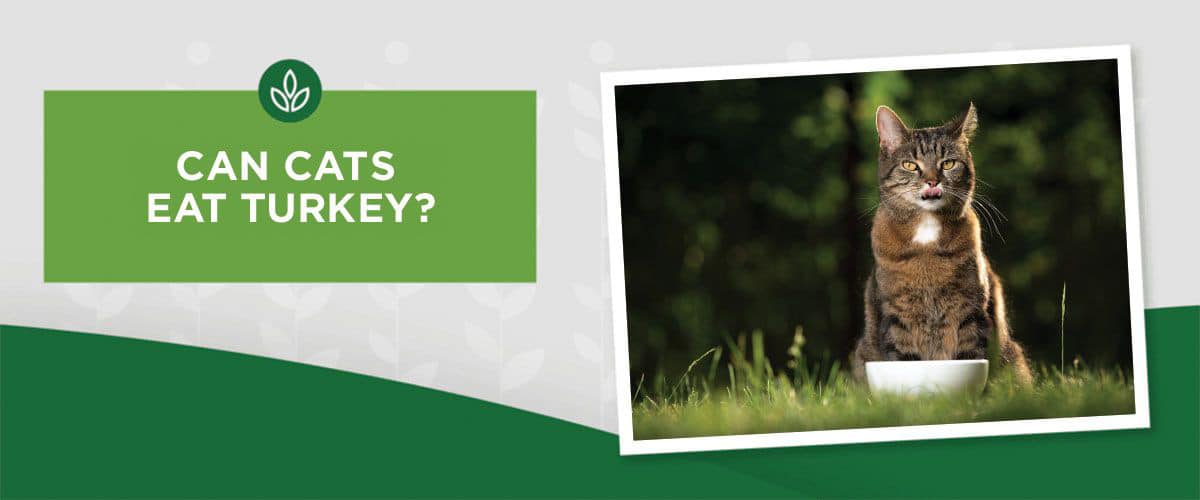Can Cats Eat Turkey? Benefits and Safety
During the holidays, some cat owners find themselves asking: Can my cat have turkey? Whether it’s a special occasion or a regular day at home, the allure of sharing a tasty piece of turkey with our feline companions presents itself often, but it’s essential to understand the advantages and precautions to keep in mind with giving new foods, like turkey, to our pets. Whether it’s a treat from the table or a change to your cat’s main source of protein, we’ll explore the benefits and safety considerations of introducing turkey to their diet.
Cats are Natural Carnivores
When it comes to feeding your cat turkey, there are a few things to understand about your cat’s natural diet and biology.
Cats are obligate carnivores, meaning their natural diet consists of a large majority of meat. Therefore, cats are biologically adapted to obtain their essential nutrients from animal tissues and proteins. Their digestive systems have evolved to efficiently process and extract nutrients from meat, making protein the cornerstone of their diet.
Benefits of Turkey as a Protein Source for Cats:
Feeding your cat turkey, either in the form of cat food or as a treat, can help meet their instinctual need for animal protein while having a variety of nutritional benefits and keeping them satisfied.
- Lean protein: Turkey is a relatively lean meat, which can be beneficial for cats, as they need a diet high in animal-based protein. Lean protein sources can help maintain a healthy weight and muscle mass.
- Low allergenicity: Turkey is less likely to be an allergen for cats compared to some other proteins. Cats can have allergies to certain proteins, and turkey can be a good option for cats with food sensitivities.
- Variety: Offering a variety of protein sources, including turkey, can help prevent boredom at the bowl and allow your cat to receive a broader range of essential nutrients.
- High-quality amino acids: Turkey is a source of essential amino acids that are necessary for various bodily functions, including muscle development, immune system support, and overall health.
- Palatability: Many cats find turkey-based cat foods to be palatable, which can help entice them to eat (as cats can be finnicky) and maintain their nutritional intake.
- Nutrient content: Turkey protein contains important nutrients such as B vitamins, zinc, and phosphorus, which are beneficial for a cat’s overall health.
Turkey aligns well with a cat’s natural dietary needs. It supports their muscle maintenance, energy levels, and overall health while providing essential amino acids, vitamins, and minerals that are vital for their well-being.
Safely Introducing Turkey into Your Cat’s Diet
-
Gradual Transition: Cats can be sensitive to sudden dietary changes. When switching their main protein source to turkey, do it gradually over a period of about 7 to 10 days. Start by mixing a small amount of their new turkey-based recipe with their current food and gradually increase the proportion of the turkey-based recipe while decreasing their old food until you’re feeding exclusively the new food.
-
Balanced Diet: Ensure that the turkey-based recipe is balanced and meets your cat’s nutritional needs for their life stage.
-
Monitor Health and Weight: Pay close attention to your cat’s health and weight during the transition. Sudden weight loss, loss of appetite, or any signs of digestive upset may indicate a problem. If you have questions or concerns, consult your vet.
-
Hydration: Cats tend to get much of their moisture from their food, so make sure your cat always has access to fresh water, especially if you are transitioning to a diet with less moisture content than wet cat food.
-
Choose High Quality Protein: Ensure that the turkey included in the recipe you’re looking at is high quality, and if you’re feeding turkey from the table, it should be free from seasonings. Remember, if the turkey protein is the first ingredient listed for the recipe you’re looking at, that means high levels of turkey are utilized.
-
Allergies and Sensitivities: Keep an eye out for any signs of food allergies or sensitivities. Common symptoms include vomiting, diarrhea, or skin issues. If your cat shows signs of an adverse reaction, consult your veterinarian.
-
Monitor Behavior: Observe your cat’s behavior during and after the transition. Cats should continue to show interest in their food and maintain their normal activity levels.
-
Supplements: If you are preparing homemade turkey-based meals, consider discussing with your veterinarian whether your cat needs supplements or other additions to their diet to ensure they receive all the necessary nutrients.
-
Consult Your Veterinarian: Always consult with your veterinarian before making significant changes to your cat’s diet. They can provide guidance based on your cat’s specific health needs and dietary requirements.
Safely Feed Your Cat Turkey During Holidays:
Offering your cat turkey scraps, especially during special occasions or holidays, can be a tempting idea. While turkey can provide health benefits when introduced into their diet correctly, sharing human food with your pup also brings potential risks. If you want to share your holiday meal with your pet, the following preparation tips can help.
- Cooked and Unseasoned: Ensure that the turkey is fully cooked and free from any seasonings, spices, or sauces. Ingredients like garlic and onions, often found in seasonings, can be toxic to cats. Cats should only consume plain, unseasoned turkey. The dark meat of a turkey is generally higher in calories, fat and cholesterol but can contain more iron and vitamins.
- Remove Bones: Be certain that there are no small bones in the turkey, as they can be a choking hazard and may splinter, potentially causing internal injuries. Remove bones before offering turkey to your cat.
- Skip the Gravy and Dressing: If you’re offering your cat a taste of turkey during a special occasion, take care to avoid gravy and dressing. These additions commonly include ingredients like garlic, onions, and spices, which can be harmful to cats.
- Skin and Fat: Turkey skin and fatty portions should be removed, as they can be hard to digest and may lead to gastrointestinal issues.
- Allergies: Watch for any signs of allergic reactions when giving your cat turkey for the first time. These may include vomiting, diarrhea, or skin issues. If your cat has food sensitivities or allergies, consult with your veterinarian before introducing turkey.
- Consult Your Veterinarian: If you have any concerns about your cat’s diet, it’s a good idea to consult with your veterinarian. They can provide guidance on suitable dietary choices for your cat’s individual needs.
Safer Alternatives: Turkey Bone Broth for Cats
If you’re looking to treat your cat to a taste of the holiday season, consider nutrient-rich turkey bone broth for cats. Bone broth can be beneficial for cats as it provides extra moisture, making it easier for them to stay hydrated and can enhance the flavor of their food, potentially encouraging them to eat. However, it should be plain, unseasoned, and given in moderation to avoid harmful ingredients or excessive salt. This all-natural bone broth is a great option.
Turkey for Cats Every Day, at Every Life Stage
Your cat can enjoy turkey as their daily, main source of protein or as an addition to their diet through turkey bone broth.
Keep in mind that cats are obligate carnivores, naturally inclined toward meat, and turkey suits their dietary needs. However, remember that they require additional vitamins and minerals. Nature’s Logic simplifies mealtimes for your cats, providing the necessary nutrients at every life stage.






